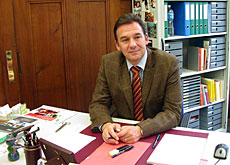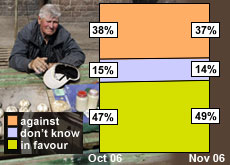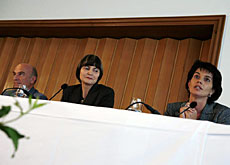Eastern Europe cooperation is “exemplary”

An economist tells swissinfo why the billions of francs devoted to cooperation programmes in eastern Europe are an excellent investment for Switzerland.
Hugo Bruggmann, head of cohesion at the State Secretariat for Economic Affairs (Seco), emphasised the positive results achieved to date in helping the former Eastern-bloc countries to democratise and develop.
On November 26, the Swiss people will vote on a revision of the federal law on cooperation with eastern Europe.
If the revised law is approved, Seco and the Swiss Agency for Development and Cooperation (SDC) will also be tasked with coordinating programmes funded from Switzerland’s SFr1 billion ($800 million) contribution to EU enlargement.
swissinfo: Since 1989, billions of francs have been devoted by western European nations, including SFr3.5 billion from Switzerland, to support development in the former Communist-bloc countries. Has this money been well spent?
Hugo Bruggmann: The aid has certainly made it possible to accelerate the process of change in many eastern European countries, which needed considerable financial help to transform their institutions and economies. I would say that this cooperation with the countries of eastern Europe has been exemplary, if we consider the results achieved.
In 1989, very few people could have imagined that eight eastern European states would make such rapid progress that, just 15 years later, they were able to join the EU. From a historical perspective, it has undoubtedly been a great achievement, and Switzerland’s contribution has been much appreciated by its European partners.
swissinfo: How do you explain the extraordinary progress made by the new eastern European members of the EU?
H.B.: These countries already had functioning institutions and economic structures, even though there was considerable room for improvement. We did not have to start from scratch. People in these countries were trained to a high level and their culture was not very different from ours.
In addition, the people we were dealing with were highly motivated. The fall of the Berlin Wall opened up amazing prospects, releasing energies that had been dormant for many years. People sprang into action; they were hungry for change.
swissinfo: In what situations have Swiss cooperation programmes proved most useful?
H.B.: Over the years, we have supported a thousand or so projects. So it is not easy to highlight any one aspect. We have certainly helped to improve many vital parts of the infrastructure, for example facilitating access to health services or drinking water for millions of people.
I would also like to mention a number of programmes conducted in Bosnia, Macedonia and other parts of the Balkans, which have certainly helped to reconcile ethnic groups divided by deep-rooted conflicts and rivalries.
swissinfo: In your view, is democracy now consolidated in the former Communist countries to the East, or are there still potential conflicts that could threaten the stability of Europe?
H.B.: On the whole, the process of political change has gone very smoothly. There have, however, been tragic exceptions, as we have seen in the Balkans, the Caucasus and Central Asia. I would say that we still need to be on our guard where these regions are concerned.
In some countries, the reforms are not sufficiently advanced, and the political situation remains fragile. The changes of recent years have also aggravated social inequalities and ethnic-minority issues.
Many of the problems in this region have a transnational dimension, such as damage to the environment, migratory pressures, and organised crime. They can be resolved only by promoting development and improving the living conditions of the local population.
Cooperation programmes are therefore an investment in a better future, a way of eliminating, or at least reducing, the risk of crises.
swissinfo: It is some years, though, since the new eastern European members of the EU completed their transition to democracy and a market economy. Do they still need our help?
H.B.: Even in these countries, particularly their eastern regions, there is still a great need for infrastructural development. In particular, there is an obvious deficit in environmental protection: for example, outside large towns there are often no sewage treatment plants.
There are also serious deficiencies in energy use, public transport and health services. More than SFr100 billion is needed for urgent action in the environmental field alone.
swissinfo: To what extent will improvements in infrastructure and economic development in the new EU member countries benefit Switzerland?
H.B.: If these countries make progress, if they create new businesses and new jobs, if they have a higher standard of living, Switzerland will also feel the benefits. Since these countries have begun to recover and increase their consumption, our exports have registered a great leap forward. Just take a look at our trade balance with them: in 2005, it was in surplus by almost SFr1.4 billion.
swissinfo-interview: Armando Mombelli
When the ten new members joined on May 1, 2004, the EU internal market increased by 75 million consumers to 475 million.
Thanks to the bilateral accords it has signed with the EU, Switzerland too can benefit from this new market.
The enlargement of the EU should lead to growth in the Swiss economy of between 0.2 and 0.5 per cent a year.
The eight new eastern European members of the EU currently absorb 3 per cent of Swiss exports.
In 2005 Switzerland’s foreign trade balance with these countries was in surplus by almost SFr1.4 billion.
Through its Structural Funds and Cohesion Fund, from 2007 the EU will be spending SFr33 billion a year to reduce the social inequalities and support the economic development of its ten new members.
At the request of the European Union, the Swiss government agreed in 2004 to make a contribution of SFr1 billion to EU enlargement.
Last March, parliament approved a new federal law on cooperation with eastern Europe, which also establishes a legal basis for allocating its contribution to the new EU members.
Opposed by way of a referendum, the new law on cooperation with eastern Europe will be put to a national vote on November 26.
Since 1990, the government has spent SFr3.45 billion assisting the former Communist countries of eastern Europe make the transition to democratic government and a market economy.
Born in 1954 at Rheinfelden in canton Aargau, Hugo Bruggmann was awarded a doctorate in economics by St Gallen University.
In 1983-84, he was a delegate of the International Committee of the Red Cross in Jordan, Lebanon and Iraq.
In 1985, he began his career at the Swiss Economics Ministry.
For five years he has been responsible, at the State Secretariat for Economic Affairs, for financial aid to central and eastern Europe, and in 2004 he became head of the Seco’s EU enlargment project.

In compliance with the JTI standards
More: SWI swissinfo.ch certified by the Journalism Trust Initiative




You can find an overview of ongoing debates with our journalists here. Please join us!
If you want to start a conversation about a topic raised in this article or want to report factual errors, email us at english@swissinfo.ch.